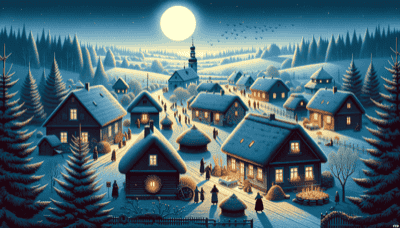We're here to help you keep count of the days to or since a date. Just click the button below and enter your chosen date to get started. Also choose the suggested days or search for a special day above #countingthedays

History and Traditions: Christmas Eve, or Ziemassvētku vakars, is a significant occasion in Latvia that blends Christian traditions with ancient Latvian winter solstice customs. The roots of these customs extend back to pre-Christian times when people celebrated the rebirth of the Sun Goddess. Over time, these pagan traditions merged with the Christian celebration of Jesus' birth.
Celebrations and Activities:
Family Gatherings: Christmas Eve is a family-centric event in Latvia. It's a time when families come together to share a special meal and enjoy each other's company.
The Christmas Meal: An essential part of the celebration is the Christmas Eve dinner, which traditionally includes 9, 12, or an odd number of dishes symbolizing abundance. Fish, grey peas with bacon (pīrāgi), cabbage, and other traditional foods are enjoyed.
Log Dragging: An old tradition involves dragging a specially selected log called a "Yule log" around the home three times before bringing it inside to burn, symbolizing the light returning after the winter solstice.
Fortune Telling: It's customary for some Latvians to engage in fortune-telling on this night using various methods such as reading wax shapes dropped into water or observing patterns in candle soot.
Gift Exchange: Exchanging gifts is also an integral part of Christmas Eve celebrations. The act is often attributed to folklore characters similar to Santa Claus known as Ziemassvētku vecītis who brings presents to children.
Attending Church: Many people attend midnight mass on Christmas Eve at their local church to mark the religious significance of the holiday.
Singing Carols: Singing traditional Latvian Christmas carols is another way families celebrate together on this special evening.
Christmas Eve in Latvia is steeped in rich traditions that blend historical pagan customs with modern Christian practices, creating a unique and deeply cultural experience for all who participate.